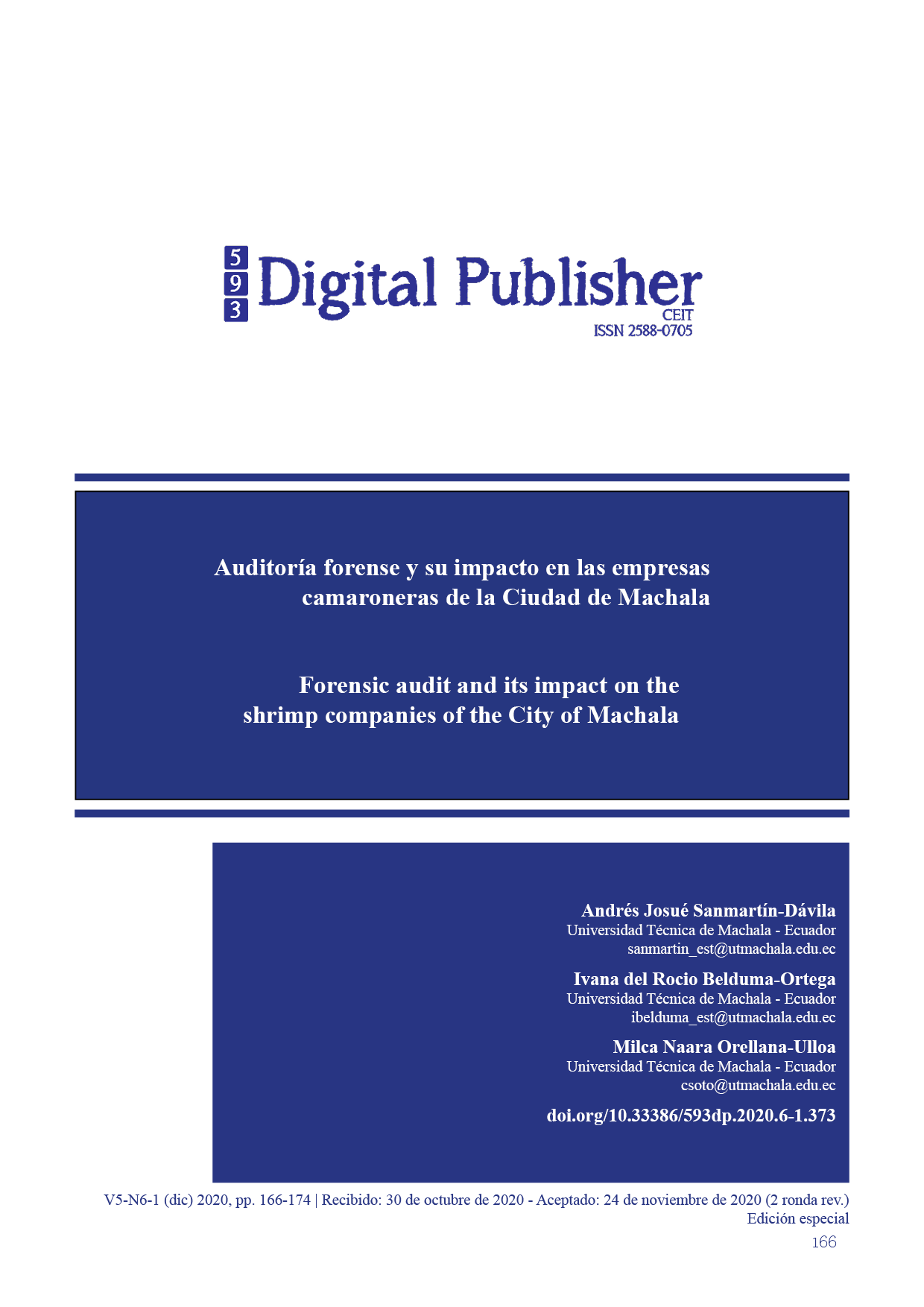Forensic audit and its impact on the shrimp companies of the City of Machala.
Main Article Content
Abstract
The objective of this article is to analyze the application of Forensic Audit especially in companies in the shrimp sector of the city of Machala; For this, the use of a cross-sectional research model was chosen, taking as informative reference scientific documents within the study period from 2018 to 2019, in addition, a data collection method with a qualitative-explanatory approach was considered, due to With the support of the in-depth interview instrument and the survey form, for this, the population to be investigated was selected, which are 185 shrimp companies according to MAGAP data, the findings found show that the shrimp companies of the City of Machala investigated, they have not executed processes of prevention, analysis and evaluation of internal processes, they have large flows of statistical and documentary information, therefore, the application of forensic audit processes are essential when detecting anomalies and crimes that attempt against companies in this industry.
Downloads
Article Details

This work is licensed under a Creative Commons Attribution-NonCommercial-ShareAlike 4.0 International License.
1. Derechos de autor
Las obras que se publican en 593 Digital Publisher CEIT están sujetas a los siguientes términos:
1.1. 593 Digital Publisher CEIT, conserva los derechos patrimoniales (copyright) de las obras publicadas, favorece y permite la reutilización de las mismas bajo la licencia Licencia Creative Commons 4.0 de Reconocimiento-NoComercial-CompartirIgual 4.0, por lo cual se pueden copiar, usar, difundir, transmitir y exponer públicamente, siempre que:
1.1.a. Se cite la autoría y fuente original de su publicación (revista, editorial, URL).
1.1.b. No se usen para fines comerciales u onerosos.
1.1.c. Se mencione la existencia y especificaciones de esta licencia de uso.
References
Aguirre, J., & Flores, M. (2019). La corrupción en Sudamérica. Una aproximación desde la auditoría forense. Espacios, 40(3), 1-9. Obtenido de http://www.revistaespacios.com/a19v40n03/a19v40n03p27.pdf
Arbeláez, C. D., Correa, C. L., & Silva, S. J. (2013). Un acercamiento a los desarrollos investigativos en la auditoría forense. Tendencias, 14(2), 216-230. Obtenido de https://dialnet.unirioja.es/servlet/articulo?codigo=4722794
Arias, G. I., Colcha, O. R., Moreno, A. M., & Gavilanes, S. M. (2019). La Gestión De Riesgos En El Lavado De Activos En La Empresa. Observatorio de la Economía Latinoamericana, 1-15. Obtenido de https://www.eumed.net/rev/oel/2019/03/riesgos-lavado-activos.html
Bernal, C. A. (2010). Metodología de la investigación. Bogota: Pearson Educacion .
Cáceres, G. G., & De la Torre, L. C. (2017). Auditoría Forense Como Medio Para Combatir La Corrupción. ARJÉ. Revista de Postgrado FaCE-UC, 11(21), 88-97. Obtenido de https://papers. ssrn. com/sol3/papers. cfm.
Cáceres, G. N. (2018). La auditoría forense y la corrupción en lagestión pública ecuatoriana. 593 Digital Publisher, 3(1), 4-16. Obtenido de http://www.593dp.com/index.php/593_Digital_Publisher/article/view/42/166
Cajiao, O. M., & Calvache, P. P. (2017). El rol del auditor en el control de los recursos públicos y la Auditoría Forense. Revista Publicando, Vol. 4(N. 11), 172-183. Obtenido de https://dialnet.unirioja.es/servlet/articulo?codigo=6115146
Calderón, N. J. (2017). Auditoria forense. Posibles tendencias de las investigaciones. Revista Publicando , Vol. 4(Nº. 10), 383-390. Obtenido de https://dialnet.unirioja.es/servlet/articulo?codigo=6115233
Cubero, T. (2018). La auditoría forense, una perspectiva desde el currículo de las carreras de Contabilidad y Auditoría en el Ecuador. Revista Economía y Política(28), 21-34. Obtenido de https://dialnet.unirioja.es/servlet/articulo?codigo=6745381
Del Pozo, B. H. (02 de 03 de 2020). Registro Oficial. Obtenido de Registro Oficial: https://www.registroficial.gob.ec/index.php/registro-oficial-web/publicaciones/registro-oficial/item/13388-registro-oficial-no-274
Garrido, L. M., Mapén, F. F., & Rosas, C. J. (2020). Auditoría Forense Estrategia para prevenir y mitigar la apropiación indebida de activos en estaciones de combustible en México. Telos: Revista de Estudios Interdisciplinarios en Ciencias Sociales, Vol. 22(Nº. 1), 125-143. Obtenido de https://dialnet.unirioja.es/servlet/articulo?codigo=7200003
Grajales, Q. J., Hormechea, J. K., & Trujillo, G. B. (2015). El papel de la auditoría forense en un caso de lavado de activos en Santiago de Cali. Cuadernos de Contabilidad, 16(42), 713-731. Obtenido de https://dialnet.unirioja.es/servlet/articulo?codigo=5712017
Grisanti, B. A. (2016). Los Fraudes en las Organizaciones y el Papel de la Auditoría Forense en este Contexto. Sapienza Organizacional, vol. 3(núm. 6), 11-36. Obtenido de https://www.redalyc.org/articulo.oa?id=553056828002
León, V. E., & Lagunas, P. S. (2017). Auditoría forense: Conceptualizaciones y adopción en América Latina. RECAI: Revista de Estudios en Contaduría, Administración e Informática, 6(15), 1-23. Obtenido de https://dialnet.unirioja.es/servlet/articulo?codigo=6881880
Mararé, V. M., Gil, G. J., Chiva, B. O., & Moliner, M. L. (2017). Validación de una ficha de observación para el análisis de habilidades socio-emocionales en Educación Física. Retos: nuevas tendencias en educación física, deporte y recreación(31), 8-13. Obtenido de https://dialnet.unirioja.es/servlet/articulo?codigo=5841334
Ocampo, C., Trejo, O., & Solarte, G. (2010). Las Tecnicas Forenses Y La Auditoria. Scientia Et Technica, 113.
Quevedo, M., Barahona, P., Quevedo, J., Ramón, G., & Cabrera, G. (2019). Estrategia de auditoria forense para la prevención de fraudes empresariales. Dominio de las Ciencias, Vol. 5(Nº. 2), 402-415. Obtenido de https://dialnet.unirioja.es/servlet/articulo?codigo=6989267
Quintanilla, C. J., & Mendoza, T. J. (2015). Caracterización de las investigaciones sobre Auditoria Forense y Corrupción en América Latina. Revista Publicando, 2(5), 143-153. Obtenido de https://dialnet.unirioja.es/servlet/articulo?codigo=5833373
Ramírez, M., & Reina, B. (2013). Methodology and Development of the Forensic Audit on Detecting Accounting Fraud in Colombia. Cuadernos de administración, Vol. 29(Nº. 50), 186-195. Obtenido de https://dialnet.unirioja.es/servlet/articulo?codigo=5006362
Toro, A. W., Reyes, T. M., Arriaga, B. G., & Espinoza, M. J. (2017). La auditoría forense como herramienta en la detección de delitos de cuello blanco. Revista de Estrategias del Desarrollo Empresarial, 3(8), 1-13. Obtenido de http://www.ecorfan.org/spain/researchjournals/Estrategias_del_Desarrollo_Empresarial/vol3num8/Revista_de_Estrategias_del_Desarrollo_Empresarial_V3_N8.pdf#page=8
Ventas, S. R. (2014). La transparencia y lucha contra el fraude fiscal y en la seguridad social en el derecho penal español. Letras jurídicas: revista electrónica de derecho(Nº. 18), 1-23. Obtenido de https://dialnet.unirioja.es/servlet/articulo?codigo=6885338




